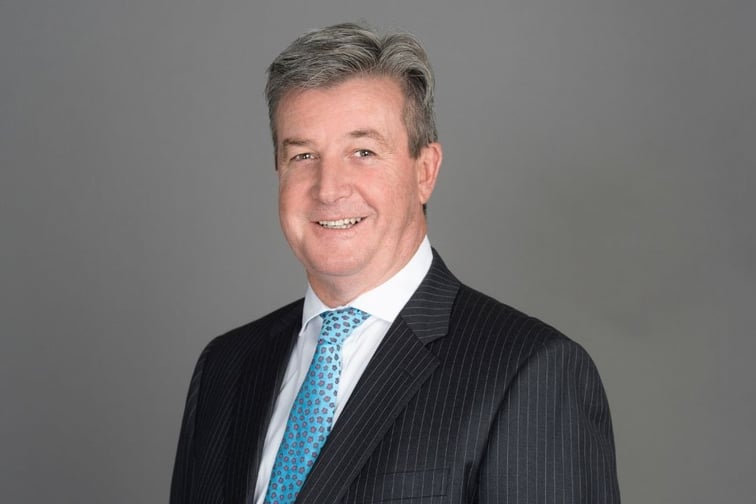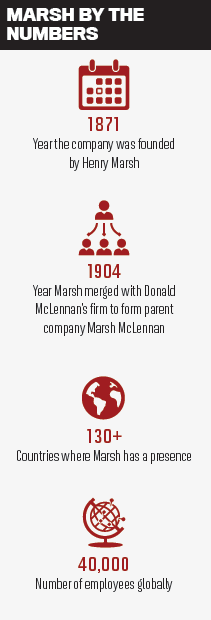

John Donnelly has enough experience to be a walking brain trust for the Australian insurance industry. Even though his career spans five decades, the head of global placement for Asia-Pacific at Marsh still remembers his very first day of work, when he was fresh out of high school.
“I do remember my first day because what I found remarkable was that you were allowed to smoke in the office,” he says. “I thought it was going to be like school.”
The date was 8 February 1977, Donnelly remembers, and the company was T.P. Clark and Chapman, which later became Jardine Lloyd Thompson and was eventually bought by Marsh. In a strange coincidence of dates, he worked at the same company again a couple of decades later and started on the same day and month: 8 February 2000.
Donnelly, who admits he has a terrible memory for names but an incredible recall capacity for facts and figures, shared that unusual symmetry of dates with the then-CFO and reeled off the old address and phone number of the company.
“And I said we bought this business called A. Hoffman Insurance on 20 June 1977,” he recalls. “And [the CFO] said, ‘How do you know that?’ I said, ‘We used to have a yellow sticker on the phone that’s sitting on your desk’ … He got out the archives, and I was exactly right.”
Much has changed since Donnelly’s early days in the industry in the 1970s and ’80s. For one thing, there’s been considerable consolidation. He remembers placing a major client’s business in the Australian property insurance market in the late 1980s.
“We would often have 30-plus insurers participating on the risk – 30 insurers who had offices in Australia,” he says. “Now we’d be lucky to have 10 or 12 insurers with offices in Australia.”
Today, he says, it’s all about having the size and scale to deliver better returns for shareholders. But is that a good thing for the industry?
“It’s a very cutthroat world,” Donnelly says. “Improving returns, superior returns, are always what you’re challenged to deliver. It’s forever hanging over your head.”
He feels the insurers that are the most successful and can endure over time are the ones that balance shareholder demands with delivering for clients.
“If you can deliver for the client, you will have a happy bunch of clients; it will produce more clients for you, which should ultimately produce those superior returns for share-holders,” he says.
The ultimate key to success, he says, is getting that balance right. And to do that, it’s not about being the smartest person in the room, it’s about passion.
 “What you really need is your own inbuilt motivation to succeed,” Donnelly says. “I think you only really get that by enjoying what you do and getting yourself really involved in the industry and with your clients.”
“What you really need is your own inbuilt motivation to succeed,” Donnelly says. “I think you only really get that by enjoying what you do and getting yourself really involved in the industry and with your clients.”
You also need help along the way, he adds. “If you can find those people, and those people have got time to help you, it’s a fantastic business to work in and a very rewarding business to be successful in.”
The other big change in the industry, of course, has been the adoption of technology and how it has facilitated an increase in data-driven underwriting decisions. Underwriters now use extensive data to measure, accept and price a risk.
“Technology, obviously, has played a massive part in how the industry has developed and where it’s going,” Donnelly says. “You go back in time, and more of the under-writing was an art than a science, and it’s now more a science than an art. There’s good and bad in that.”
The downside, Donnelly says, is that it’s more difficult to negotiate because the person you’re talking to is talking on behalf of a machine that’s produced a result. “So, we find it difficult to argue with a computer,” he says.
Going forward, Donnelly sees technology and data playing an even greater role in the industry’s future, leaving even less room for negotiation.
“As time goes on, insurance companies want to be able to model and measure risk that they take now, as opposed to trying to assess risk as much as they did when it was an art,” he says.
This new age of data does have positives, though. At Marsh, Donnelly’s job involves having a deep understanding of insurers’ appetite for certain types of risk; data helps him find answers to those questions. “Our job is to find wherever that appetite is anywhere in the world on behalf of our clients,” he says.
And, as the world’s largest insurance brokerage, Marsh has the benefit of sheer size and scale, too.
“Clients are coming to us because of our ability to trade in the global marketplace,” Donnelly says. “Scale for us is helping our clients. What we’ve had to do is adapt and collect and aggregate our data to be more knowledgeable and nimbler in the marketplace globally. That’s just the way the world’s heading, and it’s not unique to insurance.”
